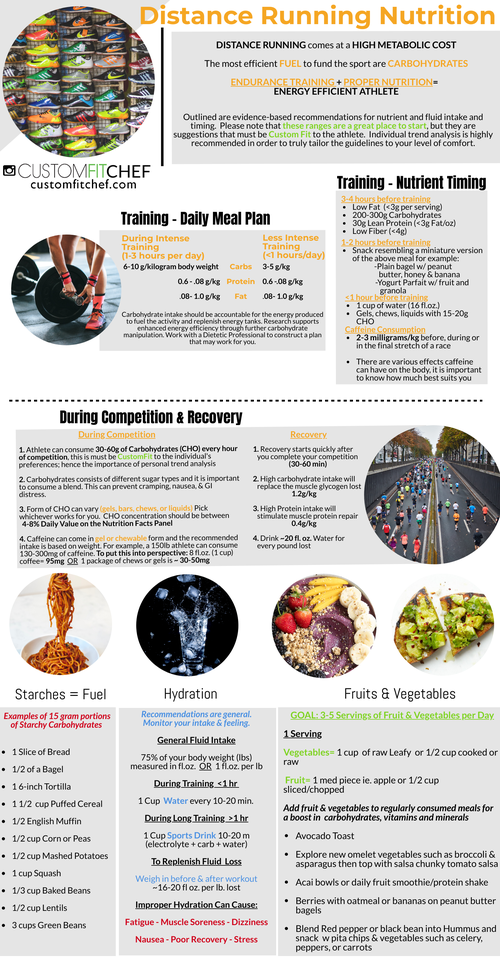MARATHON NUTRITIONAL ADVICE FROM BOSTON CELTICS’ NICK ARCURI


To find out more about Nick and his work within sports nutrition follow him on Instagram or visit his website customfitchef.com
Additional reading:
Burke, L., & Deakin, V. (2015). Chapter 14: Nutrition for recovery after training and competition. In Clinical Sports Nutrition (5th ed., pp. 420–458).
Lennon, D. (Producer). (2017, June 27). Trent Stellingwerff, PhD- Nutrition Strategies for Endurance Sports. Retrieved from Sigma Nutrition
Impey, S.G., Hearris, M. A., Hammond, K. M., Bartlett, J. D., Louis, J., Close, G. L., & Morton, J.P. (2018). Fuel for the Work Required: A Theoretical Framework for Carbohydrate Periodization and the Glycogen Threshold Hypothesis. Sports Med. 48:1031-1048. Fuel for the Work Required
Pfeiffer, B., et.al. (2012). Nutritional Intake and Gastrointestinal Problems during Competitive Endurance Events. Official Journal of the American College of Sports Medicine, 344-351.doi: 10.1249/MSS.0b013e31822dc809
Vanhauwaert, Erika & Matthys, Christophe & Verdonck, Lies & De Preter, Vicky. (2015). Low-Residue and Low-Fiber Diets in Gastrointestinal Disease Management. Advances in Nutrition: An International Review Journal.820-827. 10.3945/an. 115.009688.
Ivy, J., Goforth Jr., H., Damon, B., McCauley, T., Parsons, E., & Price, T. (2002). Early Postexercise Muscle Glycogen Recovery is Enhanced with a Carbohydrate-Protein Supplement. Journal of Applied Physiology,93(4), 1337-1344. Retrieved November 9, 2014, from American Physiological Society
Pickering, C., & Kiely, J. (2017). Are the Current Guidelines on Caffeine Use in Sport Optimal for Everyone? Inter-individual variation in caffeine Ergogenicity, and Move Towards Personalised Sports Nutrition. Sports Med. DOI 10.1007/ s40279-017-0776-1.
ADDRESSING YOUR INJURY NIGGLES AND GETTING THEM CHECKED
“Oh it’s nothing, just a niggle!” you call, as you head, grimacing, out the door for a run. After all, you feel more or less fine in yourself and it’s nothing a warm bath won’t sort out when you get home. We don’t like to complain and, especially if we’re competitive...
ANKLE INJURIES – HOW TO DIAGNOSE ONE, HOW TO GET BETTER AND HOW TO PREVENT ONE
Ankle injuries can range in severity from full fracture to mild sprain. Unfortunately even a mildly sprained ankle can be extremely painful and this can make it difficult to determine how serious your injury is and how best to treat it. However, most ankle injuries...
CLIMBING INTO THE OLYMPICS – TOKYO 2020
It is an historic day today, as we see climbing make its debut in the Olympics at Tokyo 2020. Who better to give us the inside track on the discipline than route setter and climber Alexander Lemel, patient and friend of The Lewin Sports Injury Clinic. Usually climbing...
INSIDE THE LIFE OF A GREAT BRITAIN INTERNATIONAL AND WTA TENNIS PLAYER, BY ANNA POPESCU
On International Women's Day 2021 we are delighted to share our latest blog, written by Great Britain International and WTA tour tennis player Anna Popescu. Anna travels the world representing the nation at the highest level of her sport, and has been working with...
HOW SPORTING PUPILS ARE NURTURED AT FOREST SCHOOL, BY BEN ADAMS
In our latest blog, we are delighted to hear from Ben Adams, Director of Sport at Snaresbrook's Forest School. The day school, located on the edge of Epping Forest, enjoys a partnership with The Lewin Clinic which helps students receive the quickest assessment and...

Get in touch
020 8070 7777
info@lewinclinic.co.uk
Ground Floor,
65 New North Road
Hainault
Essex
IG6 2UE
Company reg No. - 11731039 (England & Wales)
Reg address:
The Retreat
406 Roding Lane South Woodford Green
Essex IG8 8EY



